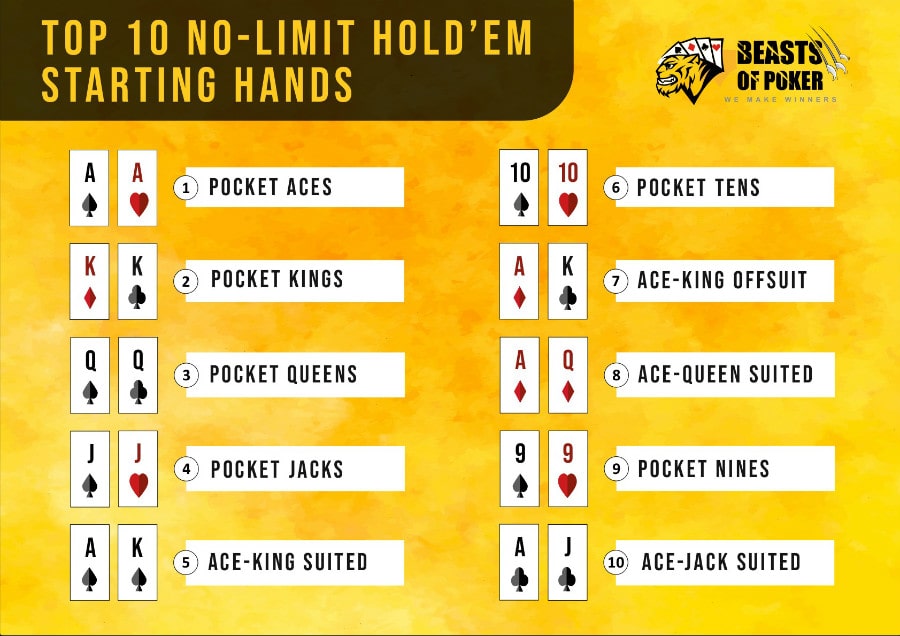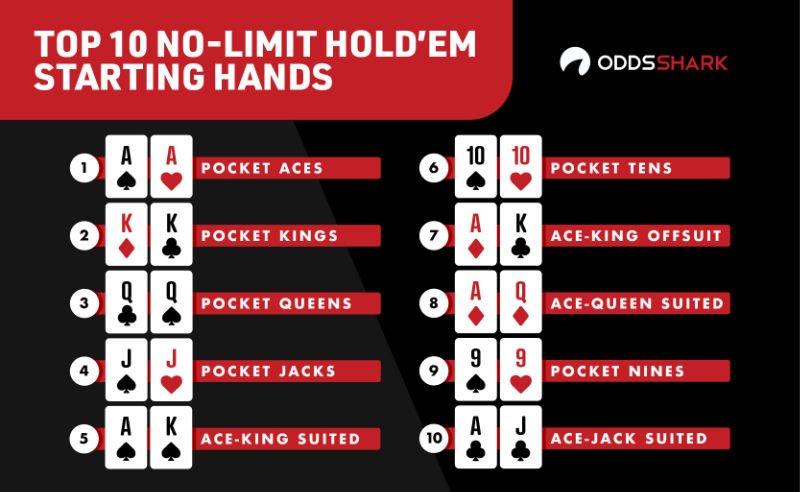Poker Starting Hand Strength
30 Aug
Texas Holdem Heads-Up Preflop Odds. This table was created by enumerating through every possible board and opponent hole card combination for each of the 169 texas holdem preflop starting hands. The strength of your starting hand in Texas Hold'em can help you determine your chances of winning, even before the remaining cards are dealt. From a pair of aces — the strongest starting hand — to a 2 and a 7, knowing the strength of your starting hand is an important part of your success at the table.
Starting Hand Selection: Chen Formula: Sklansky Starting Hand Groups. The Chen formula is a system for scoring different starting hands in Texas Hold’em. It was created by Bill Chen for use in the book Hold’em Excellence by Lou Krieger. Bill Chen is also the guy that wrote The Mathematics of Poker. Offsuit Hands; Suited Hands; Poker Hand Notation. Let’s first become familiar with the common poker starting hand notations you’ll often see in articles from the Upswing Poker Strategy section and elsewhere. All Texas Hold’em starting hands can be separated into two categories: “suited” and “offsuit”.

Whether you’re an intermediate poker player looking to fine-tune your gameplay or a complete poker novice, understanding how to play the best starting hands is crucial to winning long-term at the tables. A solid starting hand selection is one of the fundamental building blocks of any winning poker strategy. The good news is it’s not rocket science either. It’s a case of playing the best possible hands at your disposal and folding the ones that aren’t so good.
The Top 2 Percent of Starting Hands
It’s a good idea to break the starting hands down into different phases. Phase one is the top 2 percent of starting hands, which are those that can provide you with significant leverage pre-flop. Such include cards like the AA, KK, QQ and a suited AK. The latter is considered equally as valuable as pairs of aces, kings and queens because this makes it more likely for you to land a flush — and the best possible flush at that.


Professional poker player Isabelle “No Mercy” Mercier has recently started a series of articles offering guidance on how to extract the most value from premium poker hands as possible in both short-handed and full-ring play. Mercier believes that the top 2 percent of starting hands are quite strong in short-handed games and that it’s critical to extract the maximum amount of value from these hands as possible. Beginner players will often be too scared to raise as they don’t want to put opponents off and make them fold, missing out on a sizable pot.
Poker Starting Hand Strength Chart
However, this doesn’t make sense for two reasons. Firstly, if opponents always muck their hands each time you bet or raise, it’s because you’re deemed a tight player and aren’t raising enough using other hands. Secondly, if you let too many players into a hand, your premium AA hand could easily be outdrawn by a small pocket pair if it hits three-of-a-kind on the flop. Ergo, don’t be afraid to get aggressive, not only with your premium hands but when you are in position, i.e., one of the last players to act on a hand and the furthest from the dealer button. Doing so gives you free information on the strength of most of your opponents’ hands before you even need to act.
Try Not to be Too Wedded to the Second Phase of Starting Hands
Then there is the second phase of starting hands, which include the AK off-suit, AQ suited, JJ, KQ suited, AJ suited, AK off-suit and a pair of tens. Although this clutch of starting hands is potential winners, they are by no means invincible. Play them strongly in position when others are displaying weakness and don’t be afraid to fold them if a dangerous flop or turn card appears.
Don’t Be Afraid to Mix Up Your Bets/Raises
While the above strategy for premium starting hands is a good starting point for beginners, it can become a little too predictable if you only wait for the absolute “nuts” before getting involved in a hand — you’ll scare off too many of your opponents. As you develop a feel for the game and your opponents, you might want to consider limping (calling) into pots, even with premium starting hands, especially if there are only one or two players. They might get a piece of the flop, but still be well behind your starting hand, giving you significant leverage to show strength with your next bets.
The strength of your starting hand in Texas Hold'em can help you determine your chances of winning, even before the remaining cards are dealt. From a pair of aces — the strongest starting hand — to a 2 and a 7, knowing the strength of your starting hand is an important part of your success at the table. When playing Texas Hold'em you need to know which starting hands are worth staying in with—and which you should fold.
Best Starting Hands
Having a strong starting hand can help you determine your chances of winning even before the flop is dealt. In general, you're a strong contender if your starting hand contains:
- Ace/Ace: the strongest starting hand in the game.
- King/king, queen/queen, jack/jack: high pairs set you off well.
- An ace with a face card: sets a good foundation, if the flop works in your favor.
Beyond these cards, you'll also often be happy to see cards in sequence, particularly the high cards and face cards, and pairs in your starting hand. While some of these hands aren't always deemed the ideal hands, they can sometimes pay off if you're willing to take a risk. Don't forget the added bonus if your cards are all in the same suit, too. A flush, especially a straight flush or royal flush, can often win you the game. Again, the flop will play a major role in just how strong your chances are at winning, so assess carefully and determine how much risk you're willing to take.
The specific sequence of cards and the order in which they rank is an important aspect of the game. Studying up on the best starting hands in Texas Hold'em can help improve your game and your odds at winning the pot.
A strong starting hand might also encourage you to make a strong blind (your first bet).
Poker Starting Hand Strength
Worst Starting Hands
When you're dealt your starting hand, some combinations greatly reduce your chances of winning. These are generally low numbers that are not in sequence or matched. You might consider folding early if your two cards are:
- A 2 or a 3, paired with a 7 or an 8: you can't make a straight out of them.
- An ace or a face card with an unsuited low card: you're taking a risk relying on a single high card.
- Two unmatched, unsuited low cards (like 4 and 7, 5 and 8, etc.): you'll rarely win with these.
Poker Starting Hand Strength
The strategy of what to hold, and why, takes a bit to master, so studying the worst starting hands in Texas Hold'em, even more, can help you improve your game.
Beginner's Advice
Play only the cards in the 10-best list and always fold those in the worst hands list. Following this strategy may improve your results. However, there's no guarantee that receiving a strong starting hand will take the round, or that a weak starting hand is a definite loss. You never know how the flop may run, and while an unsuited 2 and 4 might seem like one to deal, sometimes you'll be pleasantly surprised with a two-pair or even a full house. Study up on the various hands you're aiming for.
How you approach the game will also differ based on the game itself. For example, if you're playing No-Limit Hold 'em, knowing the top No-Limit Hold'em hands can help you better understand how to play them.
As your skill increases, you'll also want to learn how position affects your Hold'em starting hand decisions. The more you learn, the more you'll realize how important your starting hands are to your bottom line. Play the good hands and fold the bad, and you'll be well on your way to becoming an expert at Hold'em.